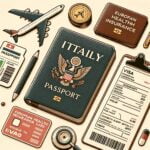Are you planning a trip to Italy and wondering, “What documents do I need to travel to Italy?” It’s important to make sure you have all the necessary paperwork in order before embarking on your Italian adventure. From passports and visas to health documents and travel insurance, there are several essential documents you’ll need to ensure a smooth and stress-free trip.
In this article, we will guide you through the essential documents required for traveling to Italy. We’ll cover everything from passport and visa requirements to travel insurance, health documents, financial considerations, important contacts, and even a packing list for your Italian getaway. By understanding what documents are necessary for your trip, you can enjoy peace of mind knowing that you’re fully prepared for your travels.
Whether you’re a first-time visitor or a seasoned traveler to Italy, it’s crucial to familiarize yourself with the necessary travel documentation. By taking the time to gather all the required paperwork and staying informed about entry regulations, you can ensure that your journey to Italy is hassle-free and enjoyable. So let’s dive into the essential documents needed for your Italian escapade.
Passport
Traveling to Italy requires certain documents that are essential for entry and a smooth trip. One of the most important documents you will need is your passport. For travelers from the United States, the passport must be valid for at least three months beyond your planned date of departure from the Schengen area.
Applying for or Renewing Your Passport
If you do not have a passport or if your current passport is nearing its expiration date, it is important to apply for or renew your passport well in advance of your trip. The process can take several weeks, so make sure to allow enough time for processing. You can apply for a new US passport at a Passport Acceptance Facility or renew an existing one by mail.
Entry Requirements for Travelers From Other Countries
For travelers from countries other than the United States, it is important to check the specific entry requirements for Italy. Some countries may have different passport validity requirements or visa regulations to consider. It’s always best to verify the specific requirements with the Italian embassy or consulate in your home country to ensure smooth entry into Italy.
In summary, having a valid passport is crucial when planning a trip to Italy. Whether it’s applying for a new one or ensuring that your current one meets the necessary validity requirements, taking care of this document early on will help avoid any last-minute complications.
Visa Requirements
When traveling to Italy, one of the most important aspects to consider is the visa requirements. For U.S. citizens, Italy is a part of the Schengen Area, which allows for visa-free travel for up to 90 days within a 180-day period.
This means that U.S. citizens do not need a visa for tourist or business trips to Italy that last less than 90 days. However, it is essential to ensure that your passport is valid for at least three months beyond your planned departure from the Schengen area.
If you are not a U.S. citizen or if you plan to stay in Italy for more than 90 days, you will need to apply for an appropriate visa at the Italian consulate or embassy in your home country. There are different types of visas depending on your purpose for visiting Italy, such as tourism, work, study, or family reunification. It’s important to review the specific requirements and gather all necessary documents before applying for a visa.
To navigate the regulations regarding visa requirements for traveling to Italy, it’s crucial to understand the different types of visas and their specific eligibility criteria. The documentation required may include a completed application form, passport-sized photos, proof of travel arrangements and accommodation bookings, proof of financial means to support yourself during your stay, medical insurance coverage, and any additional documents depending on the type of visa you are applying for.
| Visa Requirements | Necessary Documents |
|---|---|
| Completed Application Form | Passport-sized Photos |
| Proof of Travel Arrangements and Accommodation Bookings | Proof of Financial Means |
| Medical Insurance Coverage | Additional Documents (depending on visa type) |
Travel Insurance
When traveling to Italy, it’s essential to consider getting travel insurance to protect yourself and your trip. Travel insurance can provide coverage for trip cancellations, medical emergencies, lost or stolen belongings, and other unforeseen circumstances. This type of insurance can offer peace of mind during your travels and ensure that you are financially protected in case of any unexpected events.
Before purchasing travel insurance for your trip to Italy, it’s important to carefully review the policy details to understand what is and isn’t covered. Consider factors such as trip duration, coverage limits, emergency medical care, and any pre-existing conditions that may affect your coverage. Additionally, be sure to check if the travel insurance plan includes coverage for COVID-19-related issues, such as trip cancellations or medical expenses related to the virus.
When choosing a travel insurance plan for your Italian adventure, compare different options from reputable providers to find the best coverage for your needs. Some popular travel insurance companies include Allianz Travel, World Nomads, and Travel Guard. By taking the time to research and select a comprehensive travel insurance policy, you can better protect yourself from potential financial losses and disruptions during your trip.
Traveling abroad comes with its share of uncertainties, so having adequate travel insurance can help alleviate some of the stress associated with unforeseen events while in Italy. Whether it’s a sudden illness or a canceled flight, knowing that you have reliable travel insurance coverage can make all the difference during your time in this beautiful European destination.
| Documents & Requirements | Travel Insurance Details |
|---|---|
| Passport | Verify if passport information is needed when filing a claim |
| Visa | Check if visa-related issues are covered (e.g. denied entry) |
| Health Documents | Review coverage for emergency medical care abroad |
| Financial Documents | Evaluate coverage for lost or stolen money/credit cards |
Health Documents
Traveling to Italy can be an exciting and enriching experience, but it’s important to ensure that you have all the necessary documents in place to stay healthy while abroad. In addition to your passport and visa, there are several health-related documents that you should consider before embarking on your Italian adventure.
Health Insurance
One of the most important health-related documents to have when traveling to Italy is adequate health insurance. While Italy has a universal healthcare system that provides coverage for residents, visitors are not eligible for the same benefits. It is highly recommended to purchase travel insurance that includes coverage for medical emergencies, hospital stays, and medical evacuation. This will provide peace of mind and financial protection in case of unexpected illness or injury during your trip.
Vaccination Records
Before traveling to Italy, it’s a good idea to review your vaccination records and ensure that you are up-to-date on routine vaccines recommended by the Centers for Disease Control and Prevention (CDC). Depending on your travel plans and personal health history, additional vaccinations such as hepatitis A, hepatitis B, or rabies may be recommended. Checking with a healthcare provider well in advance of your trip will allow ample time to receive any necessary vaccinations before departure.
Prescriptions and Medications
If you take prescription medications regularly, it’s essential to bring an ample supply with you when traveling to Italy. It’s also wise to carry a copy of your prescriptions or a note from your healthcare provider describing the medications you are taking. Additionally, familiarize yourself with Italian regulations regarding medication importation – some medications may be considered controlled substances in Italy and require specific documentation for legal transport.
By ensuring that you have all the necessary health-related documents in place before traveling to Italy, you can enjoy peace of mind and focus on making unforgettable memories during your trip.
Currency and Financial Documents
When traveling to Italy, it is important to be prepared with the right currency and financial documents to ensure a smooth and stress-free trip. Here are the essential documents you need to manage your money while exploring the beautiful country.
Currency Exchange
Before heading to Italy, it’s important to exchange your currency for Euros, which is the official currency of Italy. You can exchange your currency at banks, exchange offices, or ATMs throughout the country. It’s advisable to carry some cash in Euros for small purchases and to have a credit card for larger expenses.
Travel Card
Consider obtaining a travel card for your trip to Italy. These prepaid cards allow you to load multiple currencies onto a single card, providing convenience and security during your travels. Travel cards also offer competitive exchange rates and can be used at ATMs and merchants that accept major credit cards.
Financial Documents
Ensure you have all necessary financial documents such as credit cards, debit cards, and traveler’s checks readily available during your trip. Make photocopies of these documents, including important contact information for your bank or financial institution, in case they are lost or stolen while abroad.
By preparing these currency and financial documents in advance, you can enjoy peace of mind knowing that you are well-equipped to manage your money throughout your Italian adventure.
Important Contacts
When traveling to Italy, it’s essential to have the right contacts to stay connected and navigate the country smoothly. Here are some important contacts you should keep in mind when planning your trip:
1. Embassy or Consulate: In case of emergencies or if you need assistance during your trip, it’s important to have the contact information for your country’s embassy or consulate in Italy. Whether you lose your passport or need legal advice, having this information on hand can be crucial.
2. Local Emergency Services: It’s always wise to know the local emergency contact numbers in Italy. For medical emergencies, dial 118 for an ambulance, and for police assistance, dial 113. Having these numbers easily accessible can provide peace of mind during your travels.
3. Accommodation Contacts: Be sure to have the contact information for your accommodations in Italy, whether it’s a hotel, rental property, or hostel. This will come in handy if you encounter any issues with your lodging or need assistance finding your way back after a day of sightseeing.
Having these important contacts readily available can help ensure a smooth and stress-free trip to Italy. By being prepared with the right information at your fingertips, you can enjoy your time in this beautiful country without worrying about unexpected challenges that may arise during your travels.
Remembering to gather all necessary documents including passport and travel insurance as well as having a comprehensive list of important contacts will allow travelers embarking on an Italian adventure to relax and enjoy their journey worry-free.
Packing List
When packing for your Italian adventure, it’s important to consider the essential items that will make your trip comfortable and enjoyable. Whether you’re exploring the historical ruins in Rome, lounging on the Amalfi Coast, or savoring the cuisine in Tuscany, having the right items with you can enhance your experience.
First and foremost, don’t forget to pack your passport and any necessary visas. These documents are crucial for entering Italy and should be kept in a safe place throughout your travels. Additionally, it’s a good idea to make copies of these documents and keep them separate from the originals, just in case they get lost or stolen.
As you prepare for your Italian adventure, consider packing clothing that is suitable for the local climate and cultural activities. Comfortable walking shoes are a must, especially if you plan on exploring cities like Florence or Venice on foot. Italy is known for its fashion-forward culture, so feel free to pack stylish outfits for dining out or enjoying a night on the town.
In addition to clothing and travel documents, there are other essential items to consider when packing for Italy. A universal adapter can be useful for charging electronic devices, while a portable power bank can keep your phone charged during long days of sightseeing.
Don’t forget sunscreen, sunglasses, and a reusable water bottle to stay hydrated while you’re out and about. With these essential items packed and ready to go, you’ll be well-prepared for an unforgettable Italian adventure.
Conclusion
In conclusion, traveling to Italy can be a smooth and stress-free experience if you have all the necessary documents in place. Ensuring that you have a valid passport, understanding the visa requirements, obtaining travel insurance, and carrying important health documents are all essential steps to take before embarking on your Italian adventure. Managing your money and having a list of important contacts can also contribute to a worry-free trip.
The most important question when planning your trip to Italy is “What documents do I need to travel to Italy?” By staying organized and prepared with the right documentation, you can save yourself from unnecessary stress and complications during your travels. Taking the time to carefully go through the checklist of required documents before your trip will ultimately lead to a more enjoyable experience once you arrive in Italy.
Ultimately, by keeping these essential documents in order, you can ensure that your journey to Italy is as seamless as possible. As you prepare for your trip, make sure to double-check all of the necessary documentation so that you can enjoy exploring the rich history, beautiful landscapes, and vibrant culture that Italy has to offer without any hiccups along the way.
Frequently Asked Questions
What Are the Travel Documents Required for Italy?
The travel documents required for Italy depend on your nationality, but generally, a valid passport is necessary for entry. For US citizens, a passport with at least six months validity beyond the date of return is required.
What Does a US Citizen Need to Visit Italy?
In order to visit Italy, a US citizen needs a valid passport. While a visa is not required for visits of up to 90 days, travelers should ensure their passport has at least six months validity beyond their planned return date.
What Do I Need Before Going to Italy?
Before going to Italy, it’s important to ensure you have the necessary travel documents such as a valid passport and any required visas. It’s also a good idea to have travel insurance and manage your finances including currency exchange and access to funds while abroad.

I’m a passionate traveler, writer, and Italophile. My fascination with Italy’s history, art, and culture has led me on countless adventures across the Italian landscape. Through “I Live Italy,” I share my love for this extraordinary country and aims to inspire others to explore its boundless beauty.





